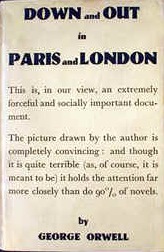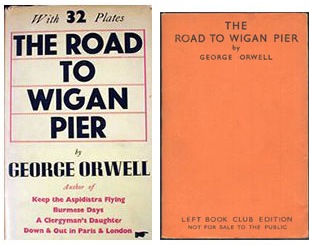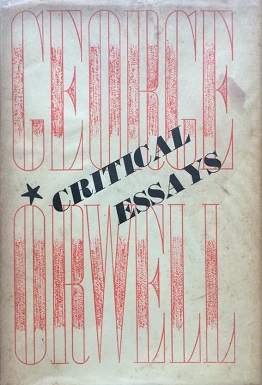Related Research Articles

Animal Farm is a satirical allegorical novella, in the form of a beast fable, by George Orwell, first published in England on 17 August 1945. It tells the story of a group of anthropomorphic farm animals who rebel against their human farmer, hoping to create a society where the animals can be equal, free, and happy. Ultimately, the rebellion is betrayed, and under the dictatorship of a pig named Napoleon, the farm ends up in a state as bad as it was before.

Eric Arthur Blair was an English novelist, poet, essayist, journalist, and critic who wrote under the pen name of George Orwell. His work is characterised by lucid prose, social criticism, opposition to totalitarianism, and support of democratic socialism.

Down and Out in Paris and London is the first full-length work by the English author George Orwell, published in 1933. It is a memoir in two parts on the theme of poverty in the two cities. Its target audience was the middle- and upper-class members of society—those who were more likely to be well educated—and it exposes the poverty existing in two prosperous cities: Paris and London. The first part is an account of living in near-extreme poverty and destitution in Paris and the experience of casual labour in restaurant kitchens. The second part is a travelogue of life on the road in and around London from the tramp's perspective, with descriptions of the types of hostel accommodation available and some of the characters to be found living on the margins.

Sturgeon's law is an adage stating "ninety percent of everything is crap". It was coined by Theodore Sturgeon, an American science fiction author and critic, and was inspired by his observation that, while science fiction was often derided for its low quality by critics, most work in other fields was low-quality too, and so science fiction was no different.

Homage to Catalonia is a 1938 memoir by English writer George Orwell, in which he accounts his personal experiences and observations while fighting in the Spanish Civil War.

The Road to Wigan Pier is a book by the English writer George Orwell, first published in 1937. The first half of this work documents his sociological investigations of the bleak living conditions among the working class in Lancashire and Yorkshire in the industrial north of England before World War II. The second half is a long essay on his middle-class upbringing, and the development of his political conscience, questioning British attitudes towards socialism. Orwell states plainly that he himself is in favour of socialism, but feels it necessary to point out reasons why many people who would benefit from socialism, and should logically support it, are in practice likely to be strong opponents.

"Politics and the English Language" (1946) is an essay by George Orwell that criticised the "ugly and inaccurate" written English of his time and examined the connection between political orthodoxies and the debasement of language.

A Clergyman's Daughter is a 1935 novel by English author George Orwell. It tells the story of Dorothy Hare, the titular clergyman's daughter, whose life is turned upside down when she suffers an attack of amnesia. It is Orwell's most formally experimental novel, featuring a chapter written entirely in dramatic form, but he was never satisfied with it and he left instructions that after his death it was not to be reprinted. Despite these instructions, Orwell did consent to the printing of cheap editions "of any book which may bring in a few pounds for my heirs" following his death.

Darkness at Noon is a novel by Hungarian-born novelist Arthur Koestler, first published in 1940. His best known work, it is the tale of Rubashov, an Old Bolshevik who is arrested, imprisoned, and tried for treason against the government that he helped to create.
"Such, Such Were the Joys" is a long autobiographical essay by the English writer George Orwell.
"Why I Write" (1946) is an essay by George Orwell detailing his personal journey to becoming a writer. It was first published in the Summer 1946 edition of Gangrel. The editors of this magazine, J.B.Pick and Charles Neil, had asked a selection of writers to explain why they write.
"Books v. Cigarettes" is an essay published in 1946 by the English author George Orwell. It compares the costs of reading to other forms of recreation including tobacco smoking.
"The Prevention of Literature" is an essay published in 1946 by the English author George Orwell. The essay is concerned with freedom of thought and expression, particularly in an environment where the prevailing orthodoxy in left-wing intellectual circles is in favour of the communism of the Soviet Union.
"Some Thoughts on the Common Toad" is an essay published in 1946 by the English author George Orwell. It is a eulogy in favour of spring.

The bibliography of George Orwell includes journalism, essays, novels, and non-fiction books written by the British writer Eric Blair (1903–1950), either under his own name or, more usually, under his pen name George Orwell. Orwell was a prolific writer on topics related to contemporary English society and literary criticism, who has been declared "perhaps the 20th century's best chronicler of English culture." His non-fiction cultural and political criticism constitutes the majority of his work, but Orwell also wrote in several genres of fictional literature.

Nineteen Eighty-Four is a dystopian novel and cautionary tale by English writer George Orwell. It was published on 8 June 1949 by Secker & Warburg as Orwell's ninth and final book completed in his lifetime. Thematically, it centres on the consequences of totalitarianism, mass surveillance, and repressive regimentation of people and behaviours within society. Orwell, a staunch believer in democratic socialism and member of the anti-Stalinist Left, modelled the Britain under authoritarian socialism in the novel on the Soviet Union in the era of Stalinism and on the very similar practices of both censorship and propaganda in Nazi Germany. More broadly, the novel examines the role of truth and facts within societies and the ways in which they can be manipulated.

"Good Bad Books" is an essay by George Orwell first published in Tribune on 2 November 1945. After Orwell's death, the essay was republished in Shooting an Elephant and Other Essays (1950).

Critical Essays (1946) is a collection of wartime pieces by George Orwell. It covers a variety of topics in English literature, and also includes some pioneering studies of popular culture. It was acclaimed by critics, and Orwell himself thought it one of his most important books.
Storm over Spain is a book by Mairin Mitchell, a pacifist commentary on the Spanish Civil War published in 1937, during the war.

"Reflections on Gandhi" is an essay by George Orwell, first published in 1949, which responds to Mahatma Gandhi's autobiography The Story of My Experiments with Truth. The essay, which appeared in the American magazine Partisan Review, discusses the autobiography and offers both praise and criticism to Gandhi, focusing in particular on the effectiveness of Gandhian nonviolence and the tension between Gandhi's spiritual worldview and his political activities. One of a number of essays written by Orwell and published between Animal Farm (1945) and Nineteen Eighty-Four (1949), "Reflections on Gandhi" was the last of Orwell's essays to be published in his lifetime and was not republished until after his death.
References
- ↑ D. J. Taylor Orwell:The Life Chatto & Windus 2003